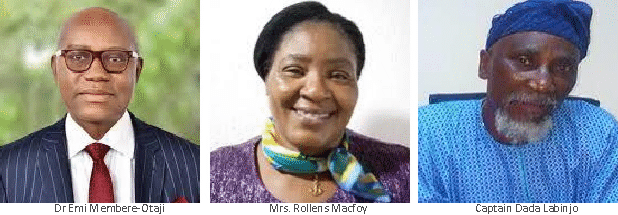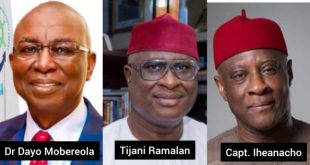It’s been almost a fortnight, that the Nigerian Maritime Administration and Safety Agency NIMASA sent 235 young Nigerians to Greece and India as batch B of the 435 cadets slated for training under the Nigerian Seafarers Development Programme(NSDP) to Greece and India to be trained as naval architects licensed deck and engine officers.
It was an auspicious event attended by the Minister of Transportation, Mu’azu Sambo Jaji; permanent secretary, Ministry of Transportation, Magdalene Ajani; Director General, NIMASA, Bashir Jamoh and other maritime stakeholders. During his speech, Jamoh disclosed that:“It is important to note that from inception to 2020, the programme has enrolled 2041 students while 892 are now licensed deck and engine officers including naval architects, the rest are in their final stage of the programme. It may please the minister to know that about 486 of the graduates are now gainfully employed and sailing in both coastal and ocean going vessels, adding that the NLNG Ship Management Limited is the leading employer of NSDP beneficiaries in the country with over 40 on their payroll already”.
This report gives credence to NSDP being successful at training a large number of cadets but their employment opportunities are limited. This is because Nigeria still lacks a national fleet and is dependent on foreign vessels which it does not have control of. The monetary contributions of Nigerian ship owners through the Cabotage Vessel Financing Fund(CVFF) in order to acquire a vessel is still a dream to become a reality for 18 years. What happens when there are professional labourers to work but they have nowhere to work?
Additionally, in a time of high foreign exchange, harsh economic realities biting the maritime industry with the resultant dwindling gains of the industry, stakeholders are concerned if Nigeria should still be training seafarers outside the country when the nation can boost about 10 schools specialized in maritime and marine studies. These include: maritime universities; Maritime Academy of Nigeria, Oron, Akwa Ibom state; Nigeria Maritime University, Okerenkoko, Gbaramatu Delta State; Delta State School of Marine Technology, Burutu, Federal College of Fisheries and Marine Technology, Lagos; Merchant Navy Maritime Academy, Warri, Delta state; Certified Institute of Shipping of Nigeria, Lagos. Could the reasons why these schools are not utilized for the NSDP training portend that they are not capable of transforming the cadets to professional seamen?
Also, it’s puzzling and unfathomable that at the end of the training of these 235 Nigerians to become professional seafarers, job scarcity would become the norm of the day because the country cannot boost a single national vessel to employ them. At the closure of the training, NIMASA may be training these men for foreign vessels and not directly investing in the nation which is the shallow interpretation of their good omen.
Industry experts air their views on this subject.
The Managing Director, Ocean Deep Services Limited and President, Nigerian Chapter of African Women in Maritime Africa, Mrs. Rollens Macfoy expressed her disgust with the decisions of the government and NIMASA in carting off young Nigerians for training overseas, stating that such action is a loss to Nigeria but pays only the foreigners. “I don’t really understand that training because if we have the Maritime Academy of Nigeria, Oron; the Nigerian Institute for Oceanography and Marine Research, Lagos and the Nigeria Maritime University, Okerenkoko but we cannot use these huge money used in sending the cadets abroad to equip these schools and bring them to world standards then we have missed it. I don’t understand what the government is doing. We have missed it, we have always missed it. Since the inception of NSDP, If we have used the money spent in these foreign trainings and invested in MAN, Oron, NIOMR, Lagos and NMU Okerenkoko, we would still have enough to buy sea going vessel or three, where when they finish schooling, the cadets would do a proper sea training with the vessels. For me, as far as I am concerned, it’s economic exploitation”, expressed Macfoy.
Macfoy also lamented the present situations of seafarers who had gone for previous foreign training but still lacked employment in Nigeria. She said: “Some of them are even security men in NIMASA and Shippers’ Council; I have met one of them. The issue is that it is good to send someone abroad for training but enough to prepare a good ground for the person to come back and fit in. Irrespective of the fact that these people are being trained abroad, the countries being patronized like the United Kingdom, Egypt, Philippines, India, Greece and even Ghana would not employ these Nigerians. They would not! They take Nigeria’s money! These cadets come back and begin to roam about. The only way you can get employment in the UK and in these foreign countries is if you are a citizen of that country and holding their Certificates of Competency (CoC). What are we doing? Do we really think of what we are doing? These cadets end up roaming about”.
Likewise, Managing Director, Elshcon Nigeria Limited, Dr Membere-Otaji identified that most times, the foreign schools lag in equipping the cadets with practical training but solely offer them theoretical knowledge which has its shortcomings. He said: “Sending our seafarers to foreign maritime schools instead of using the same money to build infrastructural and training capacities in the country is largely responsible for the low level of manpower in Nigeria despite our population and geographical location. Moreover these foreign maritime schools often give the foreign students only classroom sessions without practical sea time experience. Already many graduates from such schools are roaming, unemployed because of lack of sea time experience”.
On his part, Former President of the Nigerian Ship Owners Association and founder of Marine Law Chambers, Captain Dada Niyi Labinjo, advised that it’s wise for the government to develop Nigerians’ maritime institutions than to seek foreign help. He said: “For me, I would suggest the government invest in our maritime institutions, the amount of money that we are going to spend on them overseas, let’s put that same money in our own maritime schools. Honestly, we would get better results but of what use do you train the seafarers and when they are done; they have nowhere to work? I have seen a lady who was trained as a seafarer third officer but she went back to hair dressing because she had no job”.
 MMS PLUS NG – Maritime, Aviation, Business, Oil and Gas News Online Newspaper with coverage in Maritime, Oil and Gas, Aviation, Power and Energy as well as Financial News
MMS PLUS NG – Maritime, Aviation, Business, Oil and Gas News Online Newspaper with coverage in Maritime, Oil and Gas, Aviation, Power and Energy as well as Financial News










